Genealogy
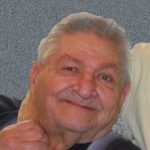 Yesterday, my family lost another of my uncles, when my Uncle Bill Beadle went home to heaven. He has been ill for some time, but that just doesn’t help you to be ready for his home going. Nothing really prepares you for that. He went peacefully in his chair, having slept through the night and awakened in his sleep, got up to watch television. It was there that Aunt Virginia found him when she got up in the morning. Knowing that Uncle Bill went home peacefully, eases my mind a little, but when I think of the many years they have been married, and how sad she is, I am very sad indeed.
Yesterday, my family lost another of my uncles, when my Uncle Bill Beadle went home to heaven. He has been ill for some time, but that just doesn’t help you to be ready for his home going. Nothing really prepares you for that. He went peacefully in his chair, having slept through the night and awakened in his sleep, got up to watch television. It was there that Aunt Virginia found him when she got up in the morning. Knowing that Uncle Bill went home peacefully, eases my mind a little, but when I think of the many years they have been married, and how sad she is, I am very sad indeed.
My cousin, Elmer Johnson, recalled that Uncle Bill was born up around Worland, Wyoming. He worked in the pipe yards, owned his own rathole drilling business with both sons, Forrest and Steve by his side. Uncle Bill was a great machinist and general all around mechanic. He loved spending time with Steve fishing and he loved to go bird hunting up around Worland. Pheasant and Chukars were his favorites, He liked hunting them, because it was much more exciting, walking the fields with that unexpected bird flying up out of nowhere giving only seconds to make the shot. Uncle Bill always had that cantankerous spirit…in the best ways, and had a way of getting you turned around and talked into doing the right thing if you were headed off course. He enjoyed his pipe, for quite a few years, and his chew. Forrest and Elmer got into that big block of chew when they were kids, didn’t know not to swallow it… well, when they swallowed it, they turned about three shades of green. Elmer tells me that he still can’t deal with chewing tobacco!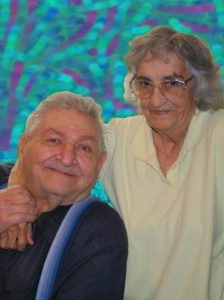
My sisters, Cheryl Masterson, Caryl Reed, Alena Stevens, Allyn Hadlock, and I were reminiscing last night about all the wonderful years since Uncle Bill joined our family. We all agreed that Uncle Bill had an incredible smile, complete with a mischievous twinkle in his eyes. He loved to tease the kids, and we all loved to be teased. Then he would laugh with his infectious laugh, and we all had a thoroughly great time. Uncle Bill was really not serious very much, at least not around us, or most of the kids. It just wasn’t a real part of his nature, unless you were heading for trouble…then he would get serious, but not in a mean way. Rather, as Elmer said, “He had a way of getting you turned around and talked into doing the right thing if you were headed off course.” And it happened before you even knew it was happening. That was Uncle Bill, and we will miss him very much. Rest in peace Uncle Bill. We love you.
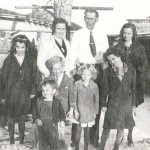 Being the youngest of my grandparents, George and Hattie Byer’s three middle children, might possibly afford my Uncle Wayne Byer a small amount of innocence in the antics the three of them pulled, but if you know Uncle Wayne, you would be hard pressed to buy into that idea, because the three of them, Uncle Larry Byer, the oldest; my mother, Collene Spencer, the middle child; and Uncle Wayne were pretty much equally to blame. I really think they drove my grandmother half crazy. What one didn’t pull, another did. They would defend each other to the end…or until Grandma got a hold of them, then all bets were off.
Being the youngest of my grandparents, George and Hattie Byer’s three middle children, might possibly afford my Uncle Wayne Byer a small amount of innocence in the antics the three of them pulled, but if you know Uncle Wayne, you would be hard pressed to buy into that idea, because the three of them, Uncle Larry Byer, the oldest; my mother, Collene Spencer, the middle child; and Uncle Wayne were pretty much equally to blame. I really think they drove my grandmother half crazy. What one didn’t pull, another did. They would defend each other to the end…or until Grandma got a hold of them, then all bets were off.
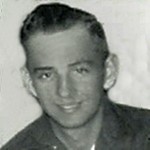
They all three had a great sense of humor, but sometimes I think that Uncle Wayne had the best one…or maybe it was that he just had a way of connecting with the kids in the family. That could easily be it, but he was definitely a big part of the three “partners in crime” that was my mom and her two brothers. I know that all kids can be a trial for parents, but I have a feeling that these three might have really tried my grandmother’s patience, and as if that wasn’t enough, there were six other children in the house too. There was lots of talent, from singing, to dancing, but partners in crime took the cake in the antics department.
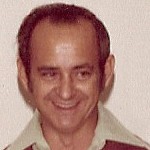 Of course, by the time I met my Uncle Wayne, he was a grown man, who’s oldest son was just two years younger than I was. All the older kids knew about it, but as the younger ones came along, we were always treated to Uncle Wayne’s signature prank…for lack of a better word. He would pop out his dentures, and encourage us to try…which we, of course did, without success. Uncle Wayne’s laugh was infectious. He just had a way of getting all of the kids laughing too. Everyone of the kids loved the uncles. They were really kids at heart…all their lives, and Uncle Wayne, being the only one left has carried on the tradition quite well. He’s a real kick. Today is my Uncle Wayne’s 80th birthday!! Happy birthday Uncle Wayne!! Have a great day!! We love you!!
Of course, by the time I met my Uncle Wayne, he was a grown man, who’s oldest son was just two years younger than I was. All the older kids knew about it, but as the younger ones came along, we were always treated to Uncle Wayne’s signature prank…for lack of a better word. He would pop out his dentures, and encourage us to try…which we, of course did, without success. Uncle Wayne’s laugh was infectious. He just had a way of getting all of the kids laughing too. Everyone of the kids loved the uncles. They were really kids at heart…all their lives, and Uncle Wayne, being the only one left has carried on the tradition quite well. He’s a real kick. Today is my Uncle Wayne’s 80th birthday!! Happy birthday Uncle Wayne!! Have a great day!! We love you!!
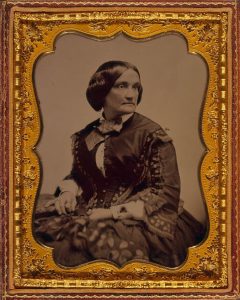 The Ambrotype (from the Ancient Greek words for immortal or impression) or Amphitype, also known as a collodion positive in England, is a positive photograph on glass made by a variant of the wet plate collodion process. Like a print on paper, it is viewed by reflected light. Like the Daguerreotype, which it replaced, and like the prints produced by a Polaroid camera, each is a unique original that could only be duplicated by using a camera to copy it.
The Ambrotype (from the Ancient Greek words for immortal or impression) or Amphitype, also known as a collodion positive in England, is a positive photograph on glass made by a variant of the wet plate collodion process. Like a print on paper, it is viewed by reflected light. Like the Daguerreotype, which it replaced, and like the prints produced by a Polaroid camera, each is a unique original that could only be duplicated by using a camera to copy it.
The Ambrotype was introduced in the 1850s. Then, during the 1860s it was replaced by the tintype, a similar photograph on thin black-lacquered iron, hard to distinguish from an Ambrotype, if under glass. It is quite the process. One side of a clean glass plate was coated with a thin layer of iodized collodion; which is a flammable, syrupy solution of pyroxylin (also known as “nitrocellulose,” “cellulose nitrate,” “flash paper,” and “gun cotton”) in ether and alcohol. The glass is then dipped in a silver nitrate solution. The plate was exposed in the camera while still wet. Exposure times varied from five to sixty seconds or more depending on the brightness of the lighting and the speed of the camera lens. The plate was then developed and fixed. The resulting negative, when viewed by reflected light against a black background, appears to be a positive image: the clear areas look black, and the exposed, opaque areas appear relatively light. This effect was integrated by backing the plate with black velvet; by taking the 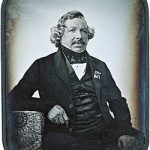 picture on a plate made of dark reddish-colored glass (the result was called a ruby Ambrotype); or by coating one side of the plate with black varnish. Either the emulsion side or the bare side could be coated: if the bare side was blackened, the thickness of the glass added a sense of depth to the image. In either case, another plate of glass was put over the fragile emulsion side to protect it, and the whole was mounted in a metal frame and kept in a protective case. In some instances the protective glass was cemented directly to the emulsion, generally with a balsam resin. This protected the image well but tended to darken it. Ambrotypes were sometimes hand-tinted; untinted ambrotypes are monochrome, gray or tan in their lightest areas.
picture on a plate made of dark reddish-colored glass (the result was called a ruby Ambrotype); or by coating one side of the plate with black varnish. Either the emulsion side or the bare side could be coated: if the bare side was blackened, the thickness of the glass added a sense of depth to the image. In either case, another plate of glass was put over the fragile emulsion side to protect it, and the whole was mounted in a metal frame and kept in a protective case. In some instances the protective glass was cemented directly to the emulsion, generally with a balsam resin. This protected the image well but tended to darken it. Ambrotypes were sometimes hand-tinted; untinted ambrotypes are monochrome, gray or tan in their lightest areas.
The Ambrotype was based on the wet plate collodion process invented by Frederick Scott Archer. Ambrotypes were deliberately underexposed negatives made by that process and optimized for viewing as positives instead. In the United States, ambrotypes first came into use in the early 1850s. In 1854, James Ambrose Cutting of 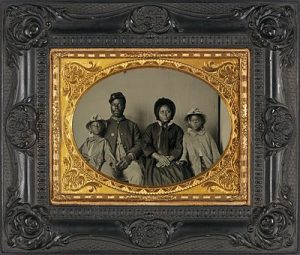 Boston took out several patents relating to the process. He may be responsible for coining the term “Ambrotype.” Ambrotypes were much less expensive to produce than daguerreotypes, the medium that predominated when they were introduced, and did not have the bright mirror-like metallic surface that could make daguerreotypes troublesome to view and which some people disliked. An Ambrotype, however, appeared dull and drab when compared with the brilliance of a well-made and properly viewed daguerreotype. It’s amazing to me that photography could be so complicated…especially when you think that these days, everything is digital, and errors can easily be fixed with Photoshop.
Boston took out several patents relating to the process. He may be responsible for coining the term “Ambrotype.” Ambrotypes were much less expensive to produce than daguerreotypes, the medium that predominated when they were introduced, and did not have the bright mirror-like metallic surface that could make daguerreotypes troublesome to view and which some people disliked. An Ambrotype, however, appeared dull and drab when compared with the brilliance of a well-made and properly viewed daguerreotype. It’s amazing to me that photography could be so complicated…especially when you think that these days, everything is digital, and errors can easily be fixed with Photoshop.
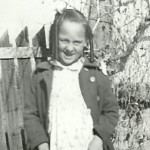
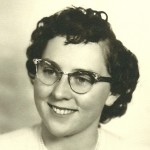 Some talents can be learned, but some tend to be things that you are just born with. I was watching a program the other day, and this couple was looking at a place to buy, and the husband mentioned that they could have a garden, and his wife said…”You can have a garden!!” He said, “Oh, because of your brown thumb.” I immediately thought of myself. A gardener I am not…and that is a fact. My husband’s aunt, Esther Hein, however, really likes to plant flowers and nurture them along. It is something that she has a talent for. I wish I did, but I was not born with that talent.
Some talents can be learned, but some tend to be things that you are just born with. I was watching a program the other day, and this couple was looking at a place to buy, and the husband mentioned that they could have a garden, and his wife said…”You can have a garden!!” He said, “Oh, because of your brown thumb.” I immediately thought of myself. A gardener I am not…and that is a fact. My husband’s aunt, Esther Hein, however, really likes to plant flowers and nurture them along. It is something that she has a talent for. I wish I did, but I was not born with that talent.
Aunt Esther also is a gifted artist and quilter. I have one of her paintings, and I really love it. Her quilting is well known, as is some of her sewing. She has made curtains and other such things for my father-in-law’s house, and I always liked knowing that those things came from Esther, with love. She made on particularly beautiful quilt for my father-in-law, that he loved so very much. It was always on their bed, and he was always extra careful to make sure that it was never harmed. Quilting is a beautiful art form, for those who are skilled enough to master it. Esther is, and again, I am not.
She also makes out a family calendar every year, with birthdays, death dates, and anniversary dates on it. It is 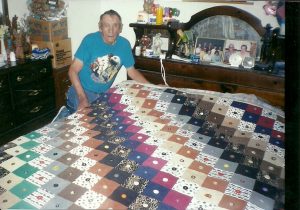 an act of love that she has done for many years for her family members. I remember looking at the calendar she sent to my father-in-law every year. The calendar had birthday and death date of people long passed, and was a great ancestry tool, as well as a way to keep up with important dates, and remember those long passed. Esther is active in her church, and loves the Lord, and she loves to play with her dogs, go camping, and snow shoeing, as well as traveling. We don’t get to see Esther as much as we would like, and we hope that maybe one of these days, her travels with bring her to Wyoming again. Of course, I suppose we should make our travels include Oregon too. Today is Esther’s birthday. Happy birthday Esther!! Have a great day!! We love you!!
an act of love that she has done for many years for her family members. I remember looking at the calendar she sent to my father-in-law every year. The calendar had birthday and death date of people long passed, and was a great ancestry tool, as well as a way to keep up with important dates, and remember those long passed. Esther is active in her church, and loves the Lord, and she loves to play with her dogs, go camping, and snow shoeing, as well as traveling. We don’t get to see Esther as much as we would like, and we hope that maybe one of these days, her travels with bring her to Wyoming again. Of course, I suppose we should make our travels include Oregon too. Today is Esther’s birthday. Happy birthday Esther!! Have a great day!! We love you!!
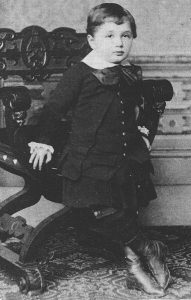 Albert Einstein has always been one of my favorite historic figures, so I decided to look for more information on him. I was surprised about some of the things I found out. Albert Einstein was born in Ulm, Germany in 1879, to parents Hermann Einstein and Pauline Einstein. Albert had a large head at the time he was born, so large, in fact that it startled his mother and grandmother when they saw him for the first time. The “fat” head slowly receded and turned into a normal size. Strangely, the head containing the brain of an amazing historic genius, was not so perfect at birth. Einstein did not speak until the age of three, odd for a genius. He revealed this fact about himself in his biography. Today there is a term, “Einstein Syndrome,” which was coined by Dr. Thomas Sowell, to describe exceptionally bright people whose speech is delayed. Einstein spent his teenage years in Munich, where his family operated an electrical equipment business. Galileo Galilei was Einstein’s favorite scientist.
Albert Einstein has always been one of my favorite historic figures, so I decided to look for more information on him. I was surprised about some of the things I found out. Albert Einstein was born in Ulm, Germany in 1879, to parents Hermann Einstein and Pauline Einstein. Albert had a large head at the time he was born, so large, in fact that it startled his mother and grandmother when they saw him for the first time. The “fat” head slowly receded and turned into a normal size. Strangely, the head containing the brain of an amazing historic genius, was not so perfect at birth. Einstein did not speak until the age of three, odd for a genius. He revealed this fact about himself in his biography. Today there is a term, “Einstein Syndrome,” which was coined by Dr. Thomas Sowell, to describe exceptionally bright people whose speech is delayed. Einstein spent his teenage years in Munich, where his family operated an electrical equipment business. Galileo Galilei was Einstein’s favorite scientist.
Albert Einstein’s lifelong love of science and math is no big secret, and in fact is what made him famous, that and his well know genius. That said, I was stunned to find out that his teachers did not  consider him a good student, and they refused to recommend him for further employment. It is said that at 16, Einstein failed an exam that would have allowed him train to become an electrical engineer. One of the things I found to be the most interesting is that Albert Einstein had a poor memory. He could not remember names, dates or phone numbers. I heard that he didn’t see the need to remember what he could have written down. Maybe this was why it needed to be written down. Most people know that he was given the Nobel Prize in 1921. It was the Nobel Prize in Physics that was awarded to Albert Einstein “for his services to Theoretical Physics, and especially for his discovery of the law of the photoelectric effect.” But, Einstein had a funny side too, and would have fit right in with the kids of today…at least in his picture taking. I really it wasn’t a selfie, but as selfies go, it fit right in with that the kids of today are doing, and apparently he though it was just as funny as they do. He was sure pleased with this one.
consider him a good student, and they refused to recommend him for further employment. It is said that at 16, Einstein failed an exam that would have allowed him train to become an electrical engineer. One of the things I found to be the most interesting is that Albert Einstein had a poor memory. He could not remember names, dates or phone numbers. I heard that he didn’t see the need to remember what he could have written down. Maybe this was why it needed to be written down. Most people know that he was given the Nobel Prize in 1921. It was the Nobel Prize in Physics that was awarded to Albert Einstein “for his services to Theoretical Physics, and especially for his discovery of the law of the photoelectric effect.” But, Einstein had a funny side too, and would have fit right in with the kids of today…at least in his picture taking. I really it wasn’t a selfie, but as selfies go, it fit right in with that the kids of today are doing, and apparently he though it was just as funny as they do. He was sure pleased with this one.
One of the most interesting things I found out was that Einstein was offered the opportunity to become  president of Israel after the its first president died in 1952. Einstein politely refused the offer, saying that he did not have the natural aptitude and experience to deal with people properly. He said that he could only understand a little of science and none of human nature. A little of science!!! Really!! I suppose that a genius would know and realize that just like the Bible, our understanding of science has only scratched the surface. Sadly, Albert Einstein had a “practical” view, if you will, of human life. He could have lived longer than he did. But, before he died, doctors suggested surgery to Einstein, because he suffered from a burst blood vessel. However, Einstein refused, stating, “It is tasteless to prolong life artificially.” I don’t understand why he ended such brilliance by refusing an operation that could save him. I find that very sad.
president of Israel after the its first president died in 1952. Einstein politely refused the offer, saying that he did not have the natural aptitude and experience to deal with people properly. He said that he could only understand a little of science and none of human nature. A little of science!!! Really!! I suppose that a genius would know and realize that just like the Bible, our understanding of science has only scratched the surface. Sadly, Albert Einstein had a “practical” view, if you will, of human life. He could have lived longer than he did. But, before he died, doctors suggested surgery to Einstein, because he suffered from a burst blood vessel. However, Einstein refused, stating, “It is tasteless to prolong life artificially.” I don’t understand why he ended such brilliance by refusing an operation that could save him. I find that very sad.
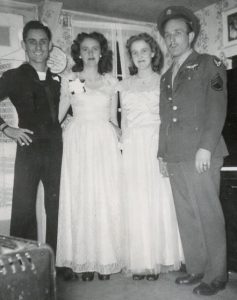 I always knew that my uncle, George Hushman served in the United States Navy during World War II, but like many of the men who fight in wars, discussing what happened during their deployment is something that few want to talk about. My family spent quite a bit of time with Uncle George and Aunt Evelyn, who was my mom’s sister, and their family, but in all those visits, I never heard my dad, Allen Spencer, or my Uncle George ever talk about their time in the war. In fact, had it not been for an old picture of the two couples going to the Military Ball, I don’t think I would have even known what branch of the military Uncle George was in.
I always knew that my uncle, George Hushman served in the United States Navy during World War II, but like many of the men who fight in wars, discussing what happened during their deployment is something that few want to talk about. My family spent quite a bit of time with Uncle George and Aunt Evelyn, who was my mom’s sister, and their family, but in all those visits, I never heard my dad, Allen Spencer, or my Uncle George ever talk about their time in the war. In fact, had it not been for an old picture of the two couples going to the Military Ball, I don’t think I would have even known what branch of the military Uncle George was in.
Recently, while researching my family history, I came across some Muster Rolls for the United States Navy, for one USS Gurke. The USS Gurke was a DD Type destroyer whose mission was to provide anti-submarine and anti-surface defense to other surface forces. The Gurke is one of 103 Gearing Class destroyers that were built at 8 different shipyards. It was originally laid down as USS John A. Bole in October of 1944, but was renamed USS Henry Gurke (DD-783) prior to her launching on February 15, 1945 at the Todd-Pacific Shipyards, Inc, in Tacoma, Washington. The ship’s sponsor was Mrs. Julius Gurke, mother of Private Gurke, for whom the ship was named. The destroyer was commissioned 12 May 1945, under the command of Commander 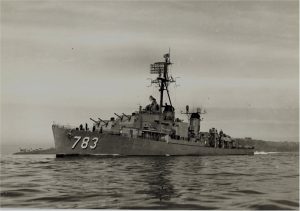 Kenneth Loveland. It was to this ship that my Uncle George was assigned beginning May 12, 1945. Prior to that he had been a S2c V6 on the USS LCI (G) 23, which was a transport ship.
Kenneth Loveland. It was to this ship that my Uncle George was assigned beginning May 12, 1945. Prior to that he had been a S2c V6 on the USS LCI (G) 23, which was a transport ship.
On the Gurke, Uncle George had a rating of S1c V6. I wasn’t sure what that meant, but I’m sure that any navy veteran would know. A V6 is a person who volunteered in World War II. As a V6 they had to be discharged by six months after the war was over. An S1c was a seamen first class. So now I knew what my uncle did during the war. Seaman first class was the rank right below a Petty Officer. The Seaman did a variety of jobs onboard the ship and could have worked anywhere on the ship. I suppose it would be a rank similar to the private, or in non-military verbiage, a laborer. That was the rank that many men went into the navy with, but a seaman first class was no longer a trainee. He had been trained to do his duties, and didn’t have to be told.
After a shakedown along the West Coast, the Gurke sailed for the Western Pacific August 27, 1945, reaching 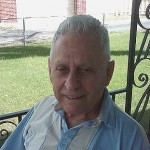 Pearl Harbor on September 2nd. From there she continued west to participate in the occupation of Japan and former Japanese possessions. Returning to home port of San Diego, in February 1946, the Gurke participated in training operations until September 4, 1947, when she sailed for another WestPac cruise. Two further WestPac cruises, alternating with operations out of San Diego, and a cruise to Alaska in 1948 aiding the celebration of the 50th anniversary of the Yukon gold rush, filled Gurke’s schedule until the outbreak of the Korean War. Of course, I assume that upon Gurke’s return to her home port of San Diego, my uncle was either assigned to another ship, was at home port, or discharged. I am very proud of his service. Today is Uncle George’s 93rd birthday. Happy birthday Uncle George!! Have a great day!! We love you!!
Pearl Harbor on September 2nd. From there she continued west to participate in the occupation of Japan and former Japanese possessions. Returning to home port of San Diego, in February 1946, the Gurke participated in training operations until September 4, 1947, when she sailed for another WestPac cruise. Two further WestPac cruises, alternating with operations out of San Diego, and a cruise to Alaska in 1948 aiding the celebration of the 50th anniversary of the Yukon gold rush, filled Gurke’s schedule until the outbreak of the Korean War. Of course, I assume that upon Gurke’s return to her home port of San Diego, my uncle was either assigned to another ship, was at home port, or discharged. I am very proud of his service. Today is Uncle George’s 93rd birthday. Happy birthday Uncle George!! Have a great day!! We love you!!
 When the colonists came over to the new world, they really didn’t know how they were going to make a living. They were most likely planning to raise their own crops, along with hunting and fishing, but the reality is that those things were only going to take them so far. They were going to need other things. In 1620, Plymouth Colony was founded in present-day Massachusetts. The settlers there had planned to make a living with cod fishing, but that wasn’t going very well. So, within a few years of their first fur export, the Plymouth colonists began concentrating entirely on the fur trade. They developed an economic system in which their chief crop, Indian corn, was traded with Native Americans to the north for highly valued beaver skins, which were then sold in England to pay the Plymouth Colony’s debts and buy necessary supplies.
When the colonists came over to the new world, they really didn’t know how they were going to make a living. They were most likely planning to raise their own crops, along with hunting and fishing, but the reality is that those things were only going to take them so far. They were going to need other things. In 1620, Plymouth Colony was founded in present-day Massachusetts. The settlers there had planned to make a living with cod fishing, but that wasn’t going very well. So, within a few years of their first fur export, the Plymouth colonists began concentrating entirely on the fur trade. They developed an economic system in which their chief crop, Indian corn, was traded with Native Americans to the north for highly valued beaver skins, which were then sold in England to pay the Plymouth Colony’s debts and buy necessary supplies.
In November 9, 1621, Robert Cushman a deacon and captain of the Fortune arrived with 35 new settlers for Plymouth Colony…the first new colonists since the settlement was founded over a year earlier. The plan was to drop off the settlers, and then a month later, head back to England with a cargo of furs to pay for supplies and to pay debts the colony owed to England. On December 13, 1621, Robert Cushman and the Fortune set sail back to England, but theirs was not to be a good voyage. During Cushman’s return to England, the Fortune was  captured by the French, and its valuable cargo of furs was taken. Cushman was detained on the Ile d’Dieu before being returned to England. The capture was due to a navigation error. About January 19, 1622, Fortune was overtaken and seized by a French warship, with those on board being held under guard in France for about a month and with its cargo taken. Fortune finally arrived back in the Thames on February 17, 1622.
captured by the French, and its valuable cargo of furs was taken. Cushman was detained on the Ile d’Dieu before being returned to England. The capture was due to a navigation error. About January 19, 1622, Fortune was overtaken and seized by a French warship, with those on board being held under guard in France for about a month and with its cargo taken. Fortune finally arrived back in the Thames on February 17, 1622.
The Fortune was 1/3 the size of the Mayflower, displacing 55 tons. The arrival of the vessel sent by the English investors, who had funded the Mayflower colonists, should have been a cause for celebration. But for the Pilgrims, Fortune was poorly named. The ship brought 35 new settlers, but none of the expected supplies. With new mouths to feed, rations were reduced by half. Worse, the investors demanded that the ship return immediately to England, stocked with trade goods. The Pilgrims complied by loading Fortune with “good clapboard as full as she could stow” and two hogsheads of beaver and otter skins, only to have them lost to the French, which the English investors did not seem to care about.
 After the Mayflower brought the Plymouth settlers, they struggled under the demands of their English investors for seven years. The investors also sent a letter criticizing the settlers because the Mayflower arrived back in England with an empty hold, and demanding that the Fortune return immediately filled with valuable goods. The colonists complied. For the next six years, they sent sizable shipments, especially of furs, back to England. But the goods yielded far less profit than the investors expected, and as the seven year mark approached, the colonists were still in debt. Finally, 27 of them pooled their personal resources and paid off the debt. Once free of the requirement to live communally and hold all property in common, the original settlers divided the land into private lots, and the era of the “Old Comers” was over.
After the Mayflower brought the Plymouth settlers, they struggled under the demands of their English investors for seven years. The investors also sent a letter criticizing the settlers because the Mayflower arrived back in England with an empty hold, and demanding that the Fortune return immediately filled with valuable goods. The colonists complied. For the next six years, they sent sizable shipments, especially of furs, back to England. But the goods yielded far less profit than the investors expected, and as the seven year mark approached, the colonists were still in debt. Finally, 27 of them pooled their personal resources and paid off the debt. Once free of the requirement to live communally and hold all property in common, the original settlers divided the land into private lots, and the era of the “Old Comers” was over.
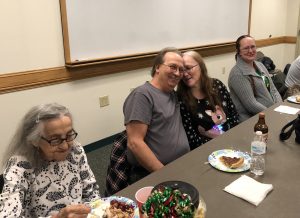
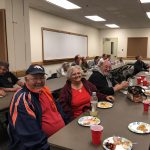
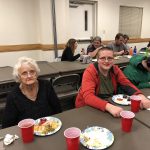 For most people the holidays are all about tradition. Of course, for all Christians, Christmas is about Jesus, but it’s also about family time, family traditions, parties, and gifts…with the greatest gift being Jesus. But, one tradition concerning those parties, for me and my family anyway, is the traditional Byer Family Christmas party. My mom, Collene Byer Spencer’s parents George and Hattie Byer started the tradition years and years ago, when their house really got too small to handle their large and ever growing family. The party was moved to the Mills Fire Hall, and on the day of the party, we literally filled it up!! Grandma and Grandpa Byer were surrounded by their loving children, grandchildren, and great grandchildren…and they were so happy. With a family as large as ours, well over 300 now, of course, you might not get to talk with each and every one, but you saw them, and they saw you, and it kept the family close. Grandma and Grandpa wanted that tradition to continue, even after their passing, and so they charged their children with the task of keeping the tradition alive, and the family close. And they did a good job of it.
For most people the holidays are all about tradition. Of course, for all Christians, Christmas is about Jesus, but it’s also about family time, family traditions, parties, and gifts…with the greatest gift being Jesus. But, one tradition concerning those parties, for me and my family anyway, is the traditional Byer Family Christmas party. My mom, Collene Byer Spencer’s parents George and Hattie Byer started the tradition years and years ago, when their house really got too small to handle their large and ever growing family. The party was moved to the Mills Fire Hall, and on the day of the party, we literally filled it up!! Grandma and Grandpa Byer were surrounded by their loving children, grandchildren, and great grandchildren…and they were so happy. With a family as large as ours, well over 300 now, of course, you might not get to talk with each and every one, but you saw them, and they saw you, and it kept the family close. Grandma and Grandpa wanted that tradition to continue, even after their passing, and so they charged their children with the task of keeping the tradition alive, and the family close. And they did a good job of it.
Now, there are several of those kids who have, themselves, gone on to Heaven, and sadly, our numbers are 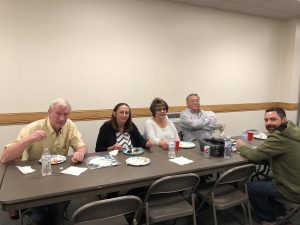
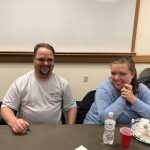
 dwindling, because we…the grandchildren have failed to take the reigns, and keep Grandma and Grandpa Byer’s dream alive. It is so easy to look at the aunts and assume that this is their duty, and not ours, but is it…really? Aren’t we, the grandchildren old enough now to also take up the simple task and honor our grandparents, and our aunts and uncles, in such a way. There are, of course, a number of the grandchildren who still come to the party every year, and we find ourselves very blessed by the evening. It is fun, and if we take a few minutes to walk around the room and visit with our aunts, uncles and cousins, we will find that we have a pretty wonderful family, and that the traditional Byer Family Christmas Party is a blessing that continues to grow…needing really just the watering of more loved ones to join in. It saddens me to think that the day might come, when it no longer makes sense to rent the facilities, because so few have shown up in past years, but it could come to that I suppose. We all think there is a lot of time to visit with our aunts, uncles, and cousins, but every time one of them goes to Heaven, we find out that there was so little time, and we wasted it, by thinking that our presence didn’t really matter. They could do without us. And yes, the party did go on, and we all had a great time, but the family members who were not there…who could have been, because they
dwindling, because we…the grandchildren have failed to take the reigns, and keep Grandma and Grandpa Byer’s dream alive. It is so easy to look at the aunts and assume that this is their duty, and not ours, but is it…really? Aren’t we, the grandchildren old enough now to also take up the simple task and honor our grandparents, and our aunts and uncles, in such a way. There are, of course, a number of the grandchildren who still come to the party every year, and we find ourselves very blessed by the evening. It is fun, and if we take a few minutes to walk around the room and visit with our aunts, uncles and cousins, we will find that we have a pretty wonderful family, and that the traditional Byer Family Christmas Party is a blessing that continues to grow…needing really just the watering of more loved ones to join in. It saddens me to think that the day might come, when it no longer makes sense to rent the facilities, because so few have shown up in past years, but it could come to that I suppose. We all think there is a lot of time to visit with our aunts, uncles, and cousins, but every time one of them goes to Heaven, we find out that there was so little time, and we wasted it, by thinking that our presence didn’t really matter. They could do without us. And yes, the party did go on, and we all had a great time, but the family members who were not there…who could have been, because they 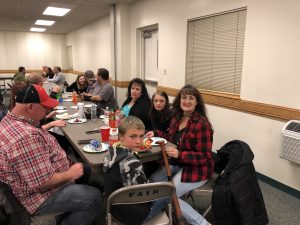
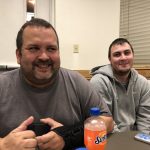
 didn’t have to work, or have anyplace else to be, the ones who simply stayed at home…believe me…yes, you were missed, very much.
didn’t have to work, or have anyplace else to be, the ones who simply stayed at home…believe me…yes, you were missed, very much.
Grandma Byer was a great cook, and she taught her children well, and they taught their children well, and I can tell you that we are a family of great cooks. The food last night was delicious, everyone enjoyed it very much. The children were able to run and play without being in the way, and their parents could relax, because no one was going to think they should make their children sit still. The party is one where everyone’s feeling are treated with care, and oh my…did the children have a great time. No one got hurt, and they got to get their wiggles out, and probably eat far too many sweets, but hey, what is a party for anyway? I loved seeing all the precious little ones, whose eyes danced with glee as they got to spend time with other children that they hadn’t seen in quite a while, and as you know, kids don’t need an introduction. The see another kid their size, and it’s an instant friendship. Oh, that we adults could make friends so easily. All too soon, the party was over, and for many of us, it will be the last time we will see each other until the summer picnic…the other family tradition. 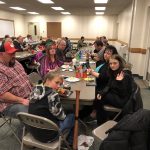
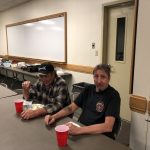
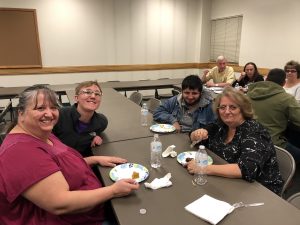 We all lead busy lives, and daily visits are hard, but Grandma and Grandpa Byer wanted us to continue the tradition. So to all of you who came, thank you. It was great to see you and I really enjoyed our time together. And to all who couldn’t be there, know that you were missed. Merry Christmas to all of you.
We all lead busy lives, and daily visits are hard, but Grandma and Grandpa Byer wanted us to continue the tradition. So to all of you who came, thank you. It was great to see you and I really enjoyed our time together. And to all who couldn’t be there, know that you were missed. Merry Christmas to all of you.

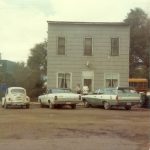 When our girls, Corrie Petersen and Amy Royce were little, we used to go to visit my husband, Bob’s aunt and uncle, Linda and Bobby Cole every year, right before school started. It was the final trip of the summer…Labor Day weekend. Soon after, they would be back in school, and they lazy days of summer would be over. We all looked forward to going, and it was always a lot of fun.
When our girls, Corrie Petersen and Amy Royce were little, we used to go to visit my husband, Bob’s aunt and uncle, Linda and Bobby Cole every year, right before school started. It was the final trip of the summer…Labor Day weekend. Soon after, they would be back in school, and they lazy days of summer would be over. We all looked forward to going, and it was always a lot of fun.
Linda and Bobby lived in the small South Dakota town of Kennebec. It was one of those towns that you could miss if you blinked on the way by. Back then there was a grocery store, a school, and one hotel…Linda and Bobby’s hotel. We never had to find a place to stay, because we always had a room in the hotel. Their hotel was an old building, filled with antiques that I’m sure were there in the days of the Old West. Well, ok, maybe not, but they were old enough to be from that era.
Kennebec operated at a very slow pace, because there wasn’t much to do there, besides visiting and a good card game. Linda and Bobby loved to play cards, when they weren’t square dancing that is. They belonged to a square dance club and they went to lots of dances during the year. They loved dancing and the costumes.
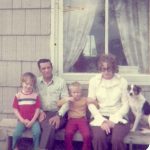
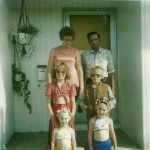 Our girls always loved to go for visits too. They got to hang out with their cousins Sheila and Pat Cole, and while they were older than our girls, they all still had a great time. The kids all played together with minimal fighting, and there was little they could do to get into trouble. We always enjoyed our visits to see Linda and Bobby and their family, and now that both Linda and Bobby are in Heaven, the memories are even more precious than they were before. Today would have been Linda’s 71st birthday. Happy birthday in Heaven, Linda. We love and miss you very much.
Our girls always loved to go for visits too. They got to hang out with their cousins Sheila and Pat Cole, and while they were older than our girls, they all still had a great time. The kids all played together with minimal fighting, and there was little they could do to get into trouble. We always enjoyed our visits to see Linda and Bobby and their family, and now that both Linda and Bobby are in Heaven, the memories are even more precious than they were before. Today would have been Linda’s 71st birthday. Happy birthday in Heaven, Linda. We love and miss you very much.
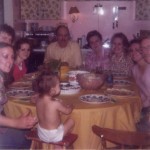
 All of my life, Thanksgiving was a time to spend the day with family, overeat Thanksgiving dinner, and relish the fact that I had the perfect family life. In my young years, everyone in my family was alive and well. The family was growing in one way or another, but until my grandfather, George Byer passed away in 1980, when I was 24 years old, I had never faced death in any way…never lost a loved one. I think it was then that I realized that things were never going to be the same again. Life would go forward, but there was no guarantee that each new year would find us celebrating with the same loved ones every year. Changes are inevitable, and loved ones going to heaven…it’s all a part of what is known as the circle of life. Still, it leaves me feeling more than a little bit lonely as the holidays, and life in general embark upon irreversible changes time after time.
All of my life, Thanksgiving was a time to spend the day with family, overeat Thanksgiving dinner, and relish the fact that I had the perfect family life. In my young years, everyone in my family was alive and well. The family was growing in one way or another, but until my grandfather, George Byer passed away in 1980, when I was 24 years old, I had never faced death in any way…never lost a loved one. I think it was then that I realized that things were never going to be the same again. Life would go forward, but there was no guarantee that each new year would find us celebrating with the same loved ones every year. Changes are inevitable, and loved ones going to heaven…it’s all a part of what is known as the circle of life. Still, it leaves me feeling more than a little bit lonely as the holidays, and life in general embark upon irreversible changes time after time.
The first years without your parents are always among the hardest. I never considered the possibility that I could one day be an orphan, and yet, I am. An orphan is, after all, someone whose parents have passed away. We usually think of an orphan as a child, but in reality, most people will become orphaned at some point in their lifetime…unless their parents outlive them. Anyway, I found myself an orphan, and the holidays…every day, in fact…have never been the same. The holiday gatherings are much smaller affairs, as my sisters and I 

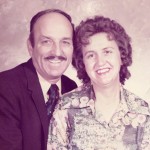 have redefined our holidays around our own families, as opposed to a large gathering of six families. While that is ok, and as it should be, there is still a small feeling of loneliness, because we don’t always see each other on the holidays now. Yes, we try to get together at least once before Christmas and a yearly picnic, just like my mom’s family has done, but the other holidays seem to have drifted into the category of small family gatherings, rather that large family gatherings. And, I have learned that in this life, you have no guarantee that your holidays will be the same from year to year, even if there is no loss in the family, because people also move away, and that changes the face of the holidays.
have redefined our holidays around our own families, as opposed to a large gathering of six families. While that is ok, and as it should be, there is still a small feeling of loneliness, because we don’t always see each other on the holidays now. Yes, we try to get together at least once before Christmas and a yearly picnic, just like my mom’s family has done, but the other holidays seem to have drifted into the category of small family gatherings, rather that large family gatherings. And, I have learned that in this life, you have no guarantee that your holidays will be the same from year to year, even if there is no loss in the family, because people also move away, and that changes the face of the holidays.
Still, Thanksgiving is a day to reflect on the things we have to be thankful for, and for me there are many. My daughters and their families are happy and well, and like my parents families did in the past, mine is growing, as my grandson, Chris Petersen and his fiancé, Karen Cruickshank are starting their own little family. We have 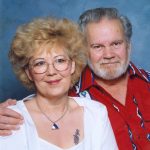
 wonderful friends, my daughter Corrie Petersen’s in-laws, Becky and Duane Skelton, who have graciously included Bob and me into their Thanksgiving holiday, and we can go to my daughter, Amy Royce’s house for gatherings too, or they can come here, so the core of my perfect family is still in there, it’s just different now. While the years have changed the face of our family gatherings, I still have a great family life, and while I can’t call it the perfect family life anymore, because my parents are in Heaven, I can still call it a very blessed family life, and for that I am very thankful.
wonderful friends, my daughter Corrie Petersen’s in-laws, Becky and Duane Skelton, who have graciously included Bob and me into their Thanksgiving holiday, and we can go to my daughter, Amy Royce’s house for gatherings too, or they can come here, so the core of my perfect family is still in there, it’s just different now. While the years have changed the face of our family gatherings, I still have a great family life, and while I can’t call it the perfect family life anymore, because my parents are in Heaven, I can still call it a very blessed family life, and for that I am very thankful.

